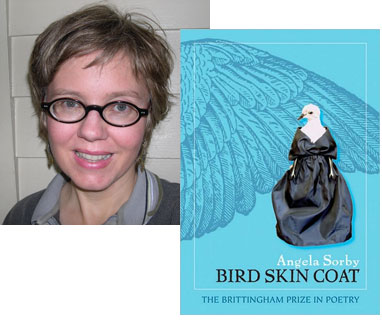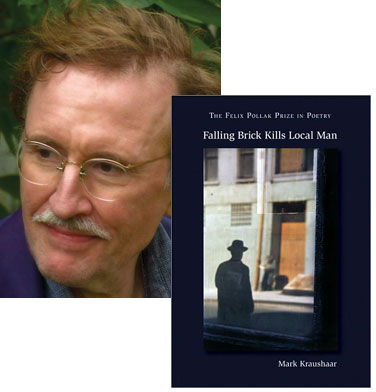Angela Sorby, “Mountain of Names”

I’m bad with names, so as I push forty,
I forgive myself for hiking lower Rainierpast lots of biggish, greyish birds
that I can’t describe more precisely.
Tit for tat: the birds don’t know
my species name, either. Homo sapiens,
nor my “common” moniker, Angela,
which means “messenger from God,”
nor are they aware of my medicinal uses,
spelled out on my organ donor card.It’s a spring day, dizzy with ignorance.
The ash in this meadow’s volcanic (I guess)
except for the one-tenth of one percent
that used to be my grandmother.
We scattered her here with no marker,
and field guides don’t list her new name,now that she’s crossed over
from the humanities to the life sciences?
Is ash a mineral?
Is death implicit in the periodic table
If I could coin a word for this meadow,
part grandmother, part volcano, I’d keep mum.
The mountain’s most itself when darkness
veils its glacier, the way key messagestransmit themselves,
sans messenger.
Bird Skin Coat is the 24th winner of the Brittingham Prize in Poetry from the University of Wisconsin-Madison English department. The collection also includes “Dove and Dove” (from The Sycamore Review). Her previous collection, Distance Learning, included “Really Barely There” (which has been reimagined as an online animation) and “Museum Piece” (from Old Hag).
Last week, Sorby had an April Fool’s article at the Chronicle of Higher Education, written from the perspective of the near future, recalling how the humanities survived our economic condition. Among the highlights:
“After the collapse, academic presses began publishing tenure books online, keeping the rigorous review process but axing production costs. As an added bonus, authors who hated their book designs or colors were given password-protected access to their cover pages, so they could change them at will. Book designers were thrown out of work, until everyone realized the horrific aesthetic consequences of allowing academics to act as art directors. By 2014, book designers were back at work, but now they are paid more than cardiologists.”
9 April 2009 | poetry |
Mark Kraushaar, “Twenty-something”

I sold my flute,
I sold my watch and my chair and my bed
and gave away my books and my TV and I took
the Greyhound bus to a town in Kentucky.
I thought I’d start over.
I thought if I could see things just as they are
(this street, this curb, sky, bottle cap, ballpoint)
I’d find out the real and the right now.
I’d locate the temperate,
gentle center of my life.
And so I walked a lot.
I’d think, Here I am, and, This is it.
I’d think, These trees, this park, this life.
This is it. This is it.
But what are you doing? my sister asked.
First she called and then she drove down from Wisconsin.
We were standing outside Kramer’s Department Store.
Maybe I wasn’t so sure anymore.
I guessed I didn’t know.
I said, I’m living.
A city bus passed and somebody waved.
Then a dog walked by.
This, I said.
And then I said it again.
Falling Brick Calls Local Man is the 15th book to win the Felix Pollak Prize in Poetry from the University of Wisconsin-Madison English department. The collection also includes “We Regret to Inform” (from The Gettysburg Review) , “Dear Mr. Whitman” (available in a PDF of an issue of Beloit Poetry Journal which includes several other Kraushaar poems).
8 April 2009 | poetry |

 Our Endless and Proper Work is my new book with Belt Publishing about starting (and sticking to) a productive writing practice.
Our Endless and Proper Work is my new book with Belt Publishing about starting (and sticking to) a productive writing practice. 
